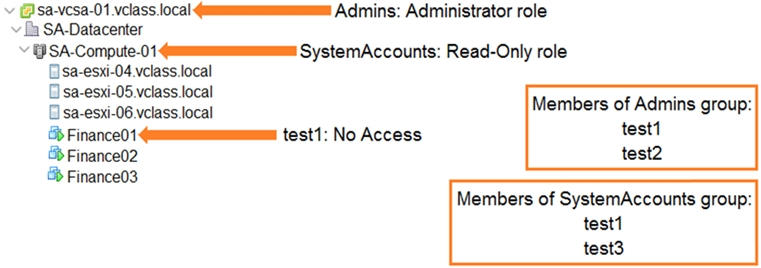Which TCP/IP stack can support management traffic, vSphere vMotion, IP storage and vSphere Fault Tolerance?
The Default TCP/IP stack is capable of supporting various types of system traffic including management traffic, vSphere vMotion, IP storage, and vSphere Fault Tolerance. It is the standard stack used to handle general network communication needs within a vSphere environment.
Refer to the exhibit.

What is the effective role the test1 account has on the Finance01 virtual machine?
The effective role that the test1 account has on the Finance01 virtual machine is No Access. Despite being a member of both the Admins group (which provides Administrator role) and SystemAccounts group (which provides Read-Only role), explicit permissions set on the Finance01 virtual machine take precedence. Since test1 is explicitly assigned No Access on Finance01, this override any inherited permissions.
A recently deployed set of test virtual machines are impacting the performance of a company development team project datastore. The shared cache server appears to be suffering from storage congestion.
Storage I/O Control is already enabled on all company datastores.
Which two steps should the administrator take to improve the performance of the cache server? (Choose two.)
To improve the performance of the cache server, the administrator should configure storage shares and storage limits per virtual machine. Configuring storage shares allows the administrator to prioritize the cache server's access to storage resources over other virtual machines, ensuring it receives the necessary resources to perform efficiently. Additionally, setting storage limits per virtual machine can prevent other virtual machines from consuming an excessive amount of storage I/O resources, thereby reducing congestion and improving the overall performance of the cache server.
A single host is manually configured to company standards.
Which option would an administrator select to capture this configuration for future use?
To capture the configuration of a manually configured host for future use, the administrator should select 'Extract Host Profile'. This allows the current configuration to be saved as a host profile, which can then be applied to other hosts to ensure consistency in configuration across the environment.
What is the minimum CPU core requirement for successful installation, or upgrade, or ESXi on a host?
The minimum CPU core requirement for the successful installation or upgrade of ESXi on a host is 2 cores. This is a well-documented requirement for ESXi 7.0, which ensures that the system has the necessary computational resources to operate effectively.